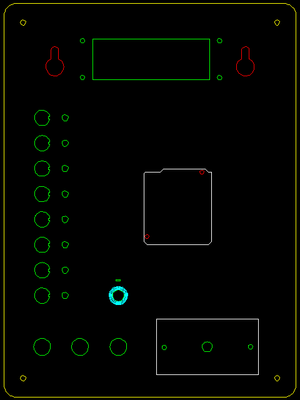Difference between revisions of "HackTrack"
From Hackstrich
(Updating build log.) |
(Shield parts/boards ordered.) |
||
| Line 42: | Line 42: | ||
=== 2011-03-06 === | === 2011-03-06 === | ||
* Finished clock + data HID reader code for Arduino | * Finished clock + data HID reader code for Arduino | ||
| + | ** What a horrible protocol! | ||
* Started working on Ethernet code for the system | * Started working on Ethernet code for the system | ||
** Realized the LCD and Ethernet Shield both use the same I/O pins, doh! | ** Realized the LCD and Ethernet Shield both use the same I/O pins, doh! | ||
| − | * Designed the HackTrack Shield for the Arduino, which gives: | + | * Designed the [[HackTrack Shield]] for the Arduino, which gives: |
** 40 digital I/Os via I2C | ** 40 digital I/Os via I2C | ||
** LCD port that can be connected directly to the Arduino or to the onboard I2C GPIOs | ** LCD port that can be connected directly to the Arduino or to the onboard I2C GPIOs | ||
*** Includes contrast pot, backlight resistors, etc. | *** Includes contrast pot, backlight resistors, etc. | ||
| + | |||
| + | === 2011-03-13 === | ||
| + | * Finalized [[HackTrack Shield]], ordered parts and PCBs. | ||
== Images == | == Images == | ||
Revision as of 20:45, 13 March 2011
HackTrack is going to be a system to keep track of who's been spending time cleaning the lab (HackLab.TO) and award points and such for doing so.
Contents
Ideas
- Lots of switches and knobs to flip/dial, LEDs to blink
- 8 big toggle switches to identify which tasks you have completed
- LEDs with each of these switches for ... something
- Space beside each toggle/LED for a written label identifying what the task is
- One of the toggle switches will have an associated selector knob for an 'other' option, knob to specify minutes put into lab cleanup or something like that
- 20x2 LCD screen for feedback and because I like LCD screens
- Three large red/yellow/green LEDs to give feedback on something (mostly because someone suggested it would look cool)
- HID reader to identify members
- Ethernet connection to send data to a message queue
- Arduino to tie everything together
- Acrylic front/back panels (as we can cut them on our lazzor), standoffs between them
Build Log
Before 2011-02-27
- Put basic design together
- Decided on the MiniProx HID reader that another lab member was going to be freeing up soon, designed front panel
- ...found it wasn't going to be freed up after all
- Redesigned front panel for the ProxPro HID reader that I had laying around
- ...found it was really big and the acrylic i wanted to use wasn't big enough
- Redesigned front panel for the ProxPoint Plus that another member donated to the project
2011-02-27
- Optimized G-code output for front/back panels, cut final versions of both (back in opaque white, front in transparent blue).
- Worked on a test of laser counterboring for the rotating selector switch nut (5 concentric circles at relatively low power repeated until enough material has vaporized)
- Will do one more test next time, then counterbore the final panel
- Test fit the following:
- Toggle switches - fit relatively well, nut doesn't have much to grab but works well enough I think
- Small LEDs - tiny bit loose in the holes, will need to tack them in with a bit of CA or something
- Large 'traffic light' LEDs - fit perfectly
- HID Reader - fits perfectly
- LCD - need longer bolts than I had at the lab, but fit looks good other than that
2011-03-05
- Tested laser counterboring a bunch, haven't done it on the final panel yet as I'm still tweaking it.
- Fit most other parts to the front panel including LCD.
- Started working on clock + data HID reader code for Arduino.
2011-03-06
- Finished clock + data HID reader code for Arduino
- What a horrible protocol!
- Started working on Ethernet code for the system
- Realized the LCD and Ethernet Shield both use the same I/O pins, doh!
- Designed the HackTrack Shield for the Arduino, which gives:
- 40 digital I/Os via I2C
- LCD port that can be connected directly to the Arduino or to the onboard I2C GPIOs
- Includes contrast pot, backlight resistors, etc.
2011-03-13
- Finalized HackTrack Shield, ordered parts and PCBs.
